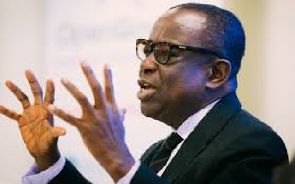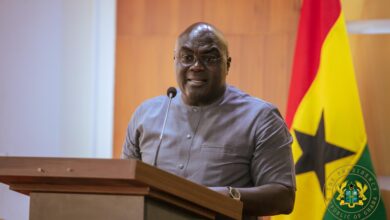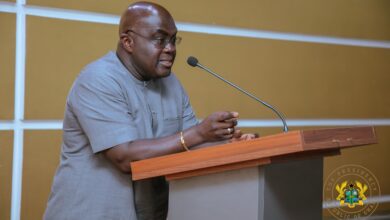
Mr Albert Kan Dapaah, Minister for National Security on Thursday cautioned vigilante groups in Ghana that they had no legal recognition, which make them illegal, and without mandate to operate in the country.
“Let’s get all such action groups to recognise that they are not to operate in the country and if they do, it will be taken as a law and order issue and they will have to go through the laws of the country as their punishment,” Mr Kan Dapaah told Parliament on Thursday.
He therefore urged Members of Parliament (MPs) and political actors to avoid giving such illegal groups party colours to make the fight against such moves successful.
Mr Dapaah said this when he was answering a question posed by Alhaji Muntaka, MP for Asawase on such action groups, on what the Ministry was doing to disband political vigilante groups.
The activities of violence of such groups have recently hit the headlines, but Mr Kan-Dapaah said politicising such groups would undermine efforts of security agencies to clamp down on their illegal activities.
Mr Kan Dapaah said such vigilante groups were not recognised by law since they were not legally registered.
“I believe it is important that we stop the activities of all such groups irrespective of what political party they are affiliated to; and I continue to urge the house to help us find a solution to this problem.
“… I must repeat again, it has all the tendencies to create huge security problems for us in the future.
A vigilante group is a group self-appointed citizens who undertake law enforcement in their community without legal authority, on the assumed grounds that the legal agencies are thought to be inadequate.
Post election times in Ghana in recent times have been characterised by the emergence of such illegal groups, often associated with the party that emerge victorious in a general election, and take the law into their hands, maltreating political opponents and vandalising private and state properties.
Sometimes dissenting members of the same political party are targeted.
Delta Force, one such group recently forced their way to the premises of the Ashanti Regional Coordinating Council and forcibly ejected the newly appointed regional security coordinator, Goerge Adjei from his office.
Other such groups were Azorka Boys allegedly associated with the minority National Democratic Congress (NDC) and the NPP’s Invincible Forces, suspected to be associated with the governing New Patriotic Party (NPP), which become very active when either parties won power.
However, Mr Kan-Dapaah said efforts were being made to stop such groups, adding that “there are no legally registered vigilante groups in this country and for that matter, there are no such groups to be disbanded.
He indicated however that “we need to be pragmatic and accept that foot soldiers of the leading political parties are known to constitute themselves into action troops to molest and unleash violence on the peace loving people of this country.
“Mr Speaker, we need to stop these groups because they have the tendency to degenerate into militant groups that can have serious repercussions on the security of this country. We must not mix criminality with politics, lawlessness must be punished.
He cautioned that the government had made it clear through the Inspector General of Police to deal appropriately with members of such criminals groups.
He urged the House to adopt a resolution that would ensure that all political leaders in the country to come together to deliberate on measures to discourage the establishment and recognition of such groups in political structures in the interest of state security.
“We must not mix criminality with politics, lawlessness must be punished as demanded by the laws of our country,” Mr Kan- Dapaah added.
Meanwhile the House has by consensus on Thursday approved 17 deputy ministers vetted by the Appointments Committee. After having approved already 11 last week, the total number of approved deputy ministers now stands at 28, remaining 22 of the 50 nominated by President Nana Addo Dankwa Akufo-Addo last month.
Below is the new set of Deputy ministers approved:
1.Joseph Dinkiok Kpemka Read – Deputy Attorney General
2.Godfred Dame – Deputy Attorney General
3.Kwabena Owusu Aduomi – Deputy minister of Roads and Highways
4.Anthony N-Yoh Puowele Karbo – Deputy minister of Roads and Highways
5.Patricia Appiagyei – Deputy Minister of Environment, Science and Technology and Innovation
6.Perry Curtis Kwabla Okudzeto – Deputy minister of Information
7.Osei Bonsu Amoah – Deputy minister of Local Government and Rural Dev’t
8.Nii Kwartei Titus Glover – Deputy minister of Transport
9.Barbara Ayisi Acher – Deputy minister for Education
10.Michael Yaw Gyato – Deputy minister of Water Resources and Sanitation
11.Benito Owusu Bio – Deputy Minister of Lands and Natural Resources
12.Kingsley Aboagye Gyedu Tina Mensah – Deputy minister of Health
13.Kwaku Agyenim Boateng – Deputy minister of Railways Development
14.Kwabena O. Darko-Mensah – Deputy minister of Aviation
15.Robert Ahomka-Lindsey – Deputy minister of Trade and Industry
16.George Andah – Deputy minister of Communications
17. Mohammed Habbib Tijani – Deputy Minister of Foreign Affairs and Regional Integration
The Minority members on the Appointments Committee on Wednesday boycotted sittings, explaining that they needed more time to properly investigate the deputy minister nominees before vetting them.
The Majority ignored their complaint and went ahead with the vetting, as the House anticipates rising sine die on Friday, April 7, 2017 and return next month.
Source: GNA




